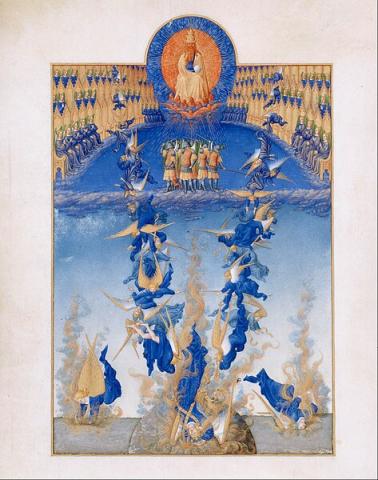[13] Cum haec dīxisset intrā sē atque resēdisset, ecce ūna ex illīs avibus volābat dē arbore—et sonābant ālae eius sīcut tintinnābulum—contrā nāvim ubi vir Deī sedēbat. [14] Quae sēdit in summitāte prōrae et coepit extendere ālās quasi signō laetitiae et placidō vultū aspicere sānctum patrem. [15] Statimque agnōvit vir Deī quia Deus recordātus esset dēprecātiōnum eius; tunc ait ad avem: [16] “Sī nūntius Deī es, nārrā mihi: unde sunt istae avēs, aut prō quā rē illārum collēctiō hīc sit?”
[17] Quae statim ait: “Nōs sumus dē illā magnā ruīnā antīquī hostis, sed nōn peccandō aut cōnsēnsū sumus; sed, ubi fuimus creātī, per lāpsum illīus cum suīs satellibus contigit et nostra ruīna. [18] Deus autem noster iūstus est et vērāx: per suum magnum iūdicium mīsit nōs in istum locum. [19] Poenās nōn sustinēmus: praesentiam Deī possumus vidēre; tantum aliēnāvit nōs ā cōnsortiō aliōrum quī stetērunt.
notes
One of birds flies down to the boat. Brendan assumes she is a messenger from God and asks about the birds. The bird explains that they were originally angels who didn't take sides when Lucifer and his angels revolted from God.
[14] quasi signō laetitiae: the birds rejoiced to meet the saint; laetitia may also represent the famous Irish word fáilte (“welcome”).
[15] quia: introduces an indirect statement; see also 1.33.
[16] prō quā rē illārum collēctiō hīc sit?: = prō quā rē sit collēctiō illārum (avium) hīc? prō + abl. in ML often means “because of”; see also OLD 17.
[17] Nōs sumus dē illā magnā ruīnā antīquī hostis: "we come from that (famous) destruction of the ancient enemy (Satan)." The story of the revolt of Lucifer and the fallen angels, central to Milton's "Paradise Lost," was known from Latin translations of the apocryphal Jewish scriptures, 1st and 2nd Enoch.
nōn peccandō aut cōnsēnsū: i.e. they were present when Satan revolted from God, but did not join in. Some medieval Christians spoke of “neutral angels,” i.e., angels that were neither completely bad nor completely good. See esp. Dante, Inferno 3.37-43.
per lāpsum ... ruīna: = per lapsum (antīquī hostis) cum suīs satellibus et nostra ruīna contigit. The fall of Satan and his minions additionally (et) involved the downfall of the neutral angels.
[19] tantum aliēnāvit nōs: "He (God) just separated us."
ā cōnsortiō aliōrum quī stetērunt: “from association with the other (angels) who remained steadfast (in their loyalty to God)."
vocabulary
| resideō residēre resēdī ressus | to be seated, remain seated; to stand back, stand still 13 |
| volō volāre volāvī volātus | to fly |
| āla ālae f. | wing |
| contrā | against; towards, in the direction of [OLD 14a] |
| tintin(n)ābulum –ī n. | a bell, signal-bell, call-bell |
| summitas –ātis f. | top; surface [OLD 2] 14 |
| prōra –ae f. | the extreme forward part of a ship; the prow |
| extendō –ere –tendī –tentus (–tēnsus) |
to stretch forth; stretch |
| āla ālae f. | wing |
| laetitia laetitiae f. | joy, happiness |
| placidus –a –um | pleasant |
| āgnōscō āgnōscere āgnōvī agnitus | to recognize, acknowledge 15 |
| quia | because; that |
| recordor recordārī recordātus sum | to remember |
| dēprecātiō –ōnis f. | a plea (by prayer) |
| prō | for, on behalf of (prep. + abl.) [OLD 3]; in view of, to judge from (+ abl.) [OLD 16b] 16 |
| collēctiō –ōnis f. | a collecting, gathering |
| ruīna ruīnae f. | collapse 17 |
| cōnsēnsus –ūs m. | agreement (CL); association (ML) |
| per | through; by means of [OLD 14] |
| lāpsus –ūs m. | fall, a falling |
| satelles satellitis m. | supporter, satellite [OLD 2] |
| ruīna ruīnae f. | collapse |
| vērāx –ācis | truthful 18 |
| per | through; by means of [OLD 14] |
| mittō mittere mīsī missus | to send, let go; to thrust; to put [OLD 13] |
| praesentia praesentiae f. | presence; protection 19 |
| aliēnō aliēnāre | to transfer, lose possession of, alienate |
| cōnsortium –ī n. | fellowship, association |
| stō stāre stetī statum | to stand; to stand firm [OLD 3a] |

